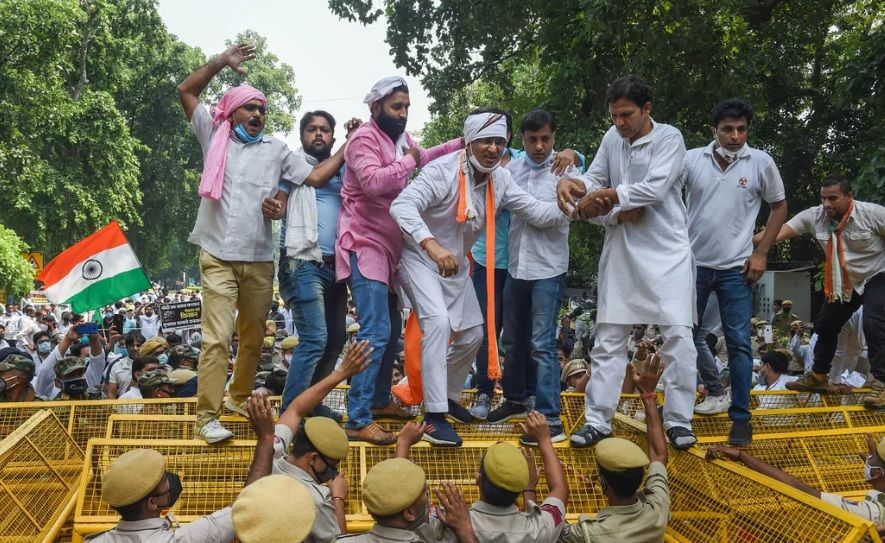On Sunday, September 27, President Ram Nath Kovind signed the three farm bills cleared by the Parliament last week, making them the law of the country, while farmers in Punjab, Haryana, Rajasthan and Uttar Pradesh continue to protest vigorously. The Farmers Produce Trade and Commerce (Promotion and Facilitation) Act, 2020; The Farmers (Empowerment and Protection) Agreement on Price Assurance and Farm Services Act, 2020; and The Essential Commodities (Amendment)Act, 2020 are now notified Acts in the country.
Farmers’s organisation and political parties opposing the new farm laws have intensified their agitation. Punjab chief minister Captain Amarinder Singh has begun a sit-in protest at Khatkar Kalan, the ancestral village of freedom fighter Shaheed Bhagat Singh. As per news reports, his government plans to approach the Supreme Court over the three new farm laws. Meanwhile, Kerala MP T N Prathapan has already moved the apex court against the Acts with a plea seeking quashing of these laws as being unconstitutional.
In Karnataka, a dusk-to-dawn bandh is being followed today.
Farmers are concerned about the missing ‘minimum support price’ (MSP) clause in any of the bills. They want the government to provide for a minimum support price for crops, that they say should be made a legal right. Without that, they fear, they will be at the mercy of corporate will.
“The government has not mentioned anywhere that the minimum support price will continue. Assurance of the prime minister will not work until and unless the government mentions that in the Act,” Nitish Pahwa, a farmer from Malout, Punjab, told Gaon Connection.
Over the last couple of months, protests have erupted across the agrarian community in Punjab, Haryana and Uttar Pradesh against the bills that are accused of being ‘anti-farmers’. On September 10, thousands of farmers gathered at the Pipli Mandi in Kurukshetra, Haryana for the Kisan Bachao Mandi Bachao rally despite Section 144 being imposed. Many were injured in clashes with the police.
There were political repercussions of the protests, the most recent one being on Saturday, when National Democratic Alliance’s (NDA) oldest ally the Shiromani Akali Dal walked out of NDA. Earlier this month, on September 17, Akali Dal’s Harsimrat Kaur Badal, union cabinet minister of Food Processing Industries, and member of parliament in the Lok Sabha from Bathinda, also resigned from the cabinet for the same reason.

In Haryana, the Jannayak Janta Party which is an ally of the ruling Bharatiya Janata Party, sided with the farmers, voiced their outrage and pledged its support to their agitation. On September 23, Gaon Connection had reported that allies of the NDA in Punjab and Haryana were speaking out against the Union government’s stand on the farm bills.
Meanwhile, on September 25, farmers, farmers’ unions and organisations coming under the umbrella of the All India Kisan Sangharsh Coordination Committee, called for a nationwide shutdown. A massive turnout of farmers blocked roads and stopped trains from running. Twenty eight trains were cancelled including the Amritsar-Jaynagar Express, and the New Delhi-Jammu Tawi Express. The “rail roko” agitation that was scheduled to conclude on September 26, was extended by another three days. Farmers lay down on the tracks between Delhi and Amritsar and also blocked major highways including the one which connects Delhi to Noida.
Not just for the farmers, the bills will have wider implications say the detractors. “The three laws are going to destroy the farmers, middlemen, transporter and labourers. The state government will lose out on all the taxes that are charged at the mandis, so this law is also affecting the state revenue,” Rana Gurjeet Singh, Congress MLA, and former cabinet minister of Punjab from Kapurthala told Gaon Connection.
“Punjab is an agrarian state, there is no other source of development for it. And the Bharatiya Janata Party government continues to be silent on the minimum support price,” he added .

On its part the union government defended its stand and assured the farmers that their fears were unfounded and that there was no cause for concern as the bills would safeguard their interests and liberate them. The central government also categorically stated that the bills would not affect the minimum support price, nor would it do away with the mandi system.
“All Bharatiya Janata Party workers should reach out to farmers on the ground and inform them in simplified language about the importance and intricacies of the new farm reforms, and how these will empower them. Our efforts will bust the lies and rumours being spread in the virtual world,” Prime Minister Narendra Modi said in his address to the BJP leaders and workers on the birth anniversary of Deendayal Upadhyay on September 25.
However, not all farmers are alarmed. “We are happy that the three bills were passed. This will eliminate the middlemen and we will have the option to decide at what price we want to sell our produce,” Karamveer Singh, a farmer from Pilibhit in Uttar Pradesh, told Gaon Connection.
The central government, in a conciliatory gesture, has expedited the procurement dates of the kharif paddy, which was to begin only in the first week of October. “In view of early arrival of paddy in the ‘mandis’ of Haryana and Punjab, Government of India has approved the commencement of procurement operations for paddy/ rice immediately in both these States with effect from 26th September, 2020 to ensure that farmers are facilitated in selling their produce at minimum support price expeditiously,” the ministry of consumer affairs, food & public distribution, said in a statement.
Calling the advancement of the date an ‘extraordinary step’ by the government, Sudhanshu Pandey, food secretary tweeted that orders have been issued and State procurement agencies and Food Corporation of India have been mobilized fully to start operations in view of early paddy arrivals in mandis.
In the meanwhile, the agitations look far from being over as Shiromani Akali Dal’s president Sukhbir Singh is mobilising a Punjab Kisan March to Chandigarh on October 1 from Takht Damdama Sahib, Akal Takht Sahib and Anandpur Sahib.
The Farmers’ Produce Trade and Commerce (Promotion and Facilitation) Act, 2020, seeks to give freedom to farmers to sell their produce outside of the notified Agricultural Produce Market Committee (APMC) market yards.
The Farmers (Empowerment and Protection) Agreement of Price Assurance and Farm Services Act, 2020, will give farmers the right to enter into a contract with agribusiness firms, processors, wholesalers, exporters, or large retailers for the sale of future farming produce at a pre-agreed price.
The Essential Commodities (Amendment) Act, 2020, will remove commodities like cereals, pulses, oilseeds, onion, and potato from the list of essential commodities and will do away with the imposition of stock holding limits.


















